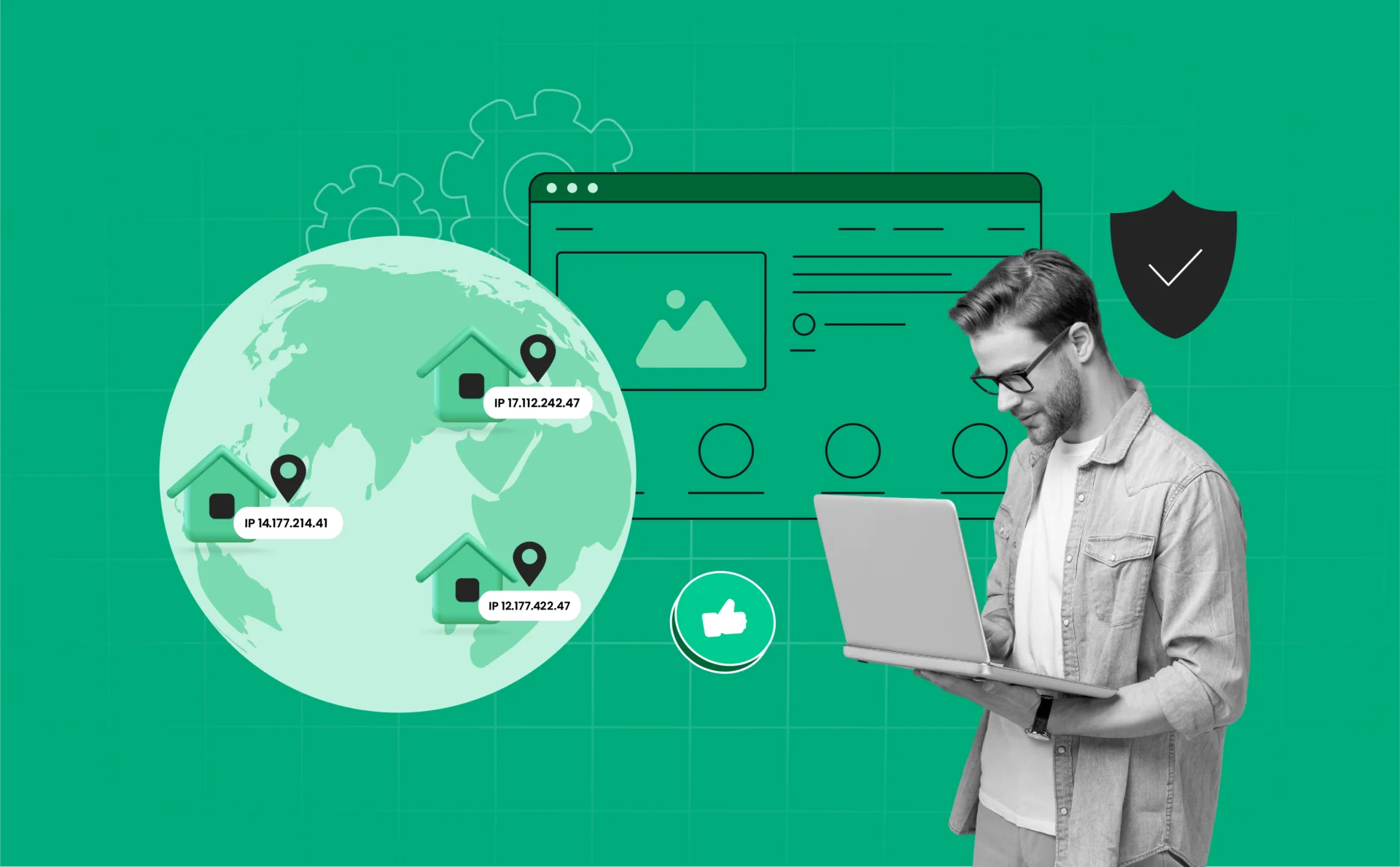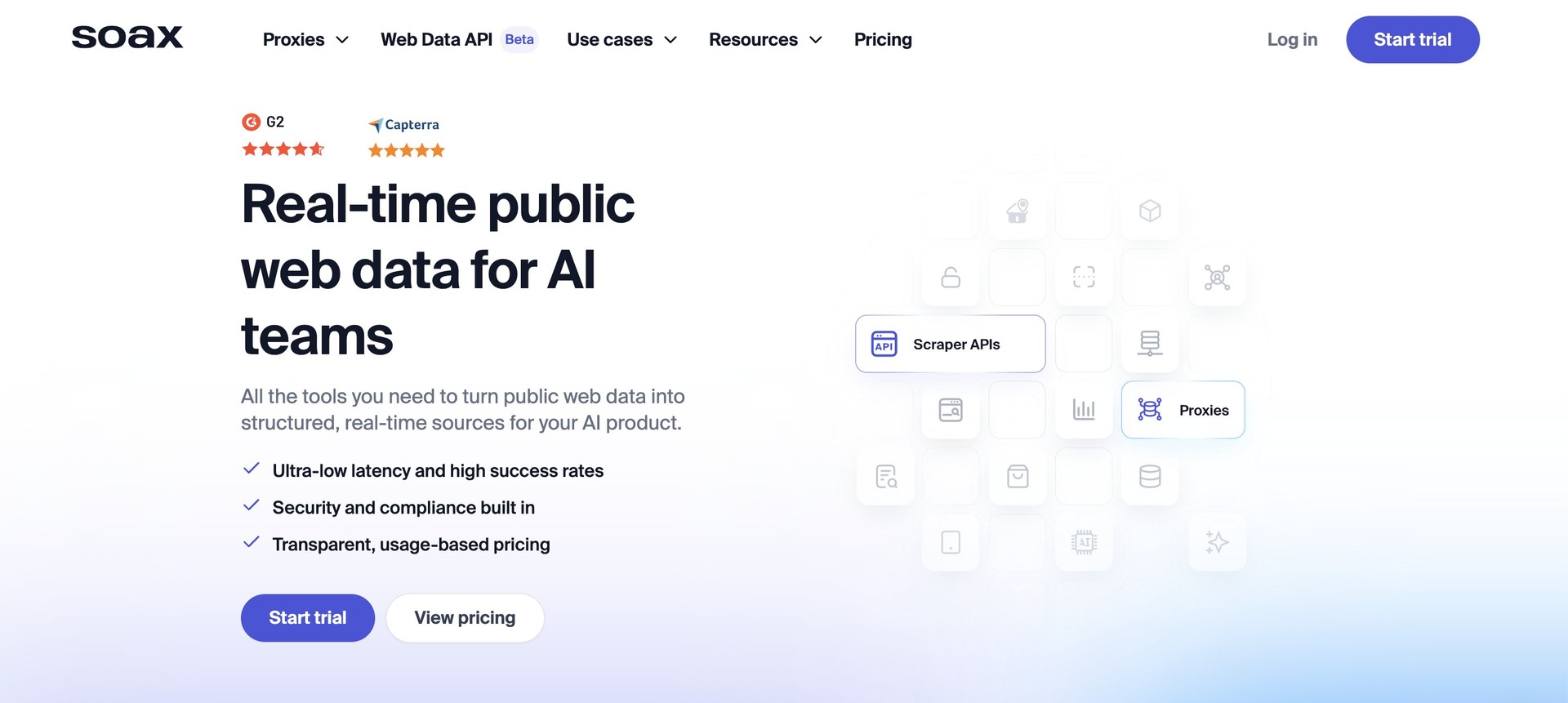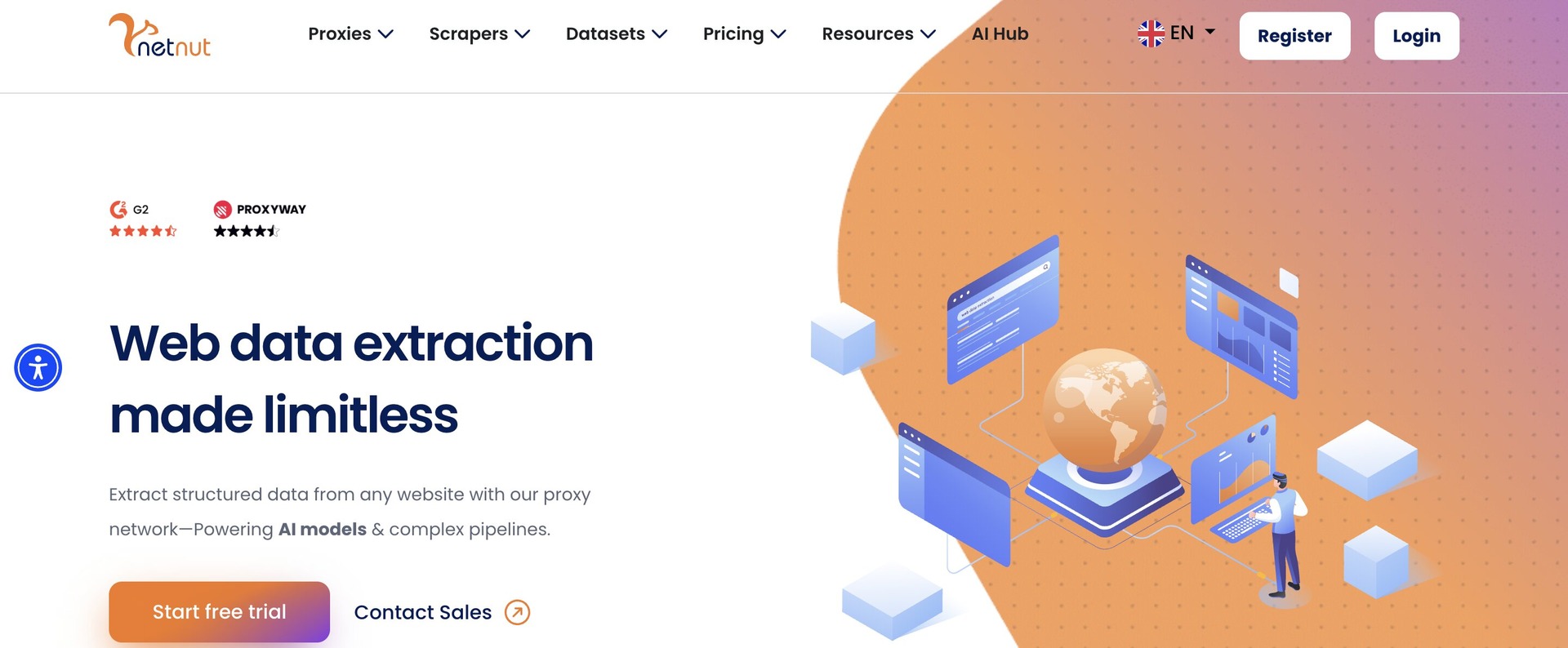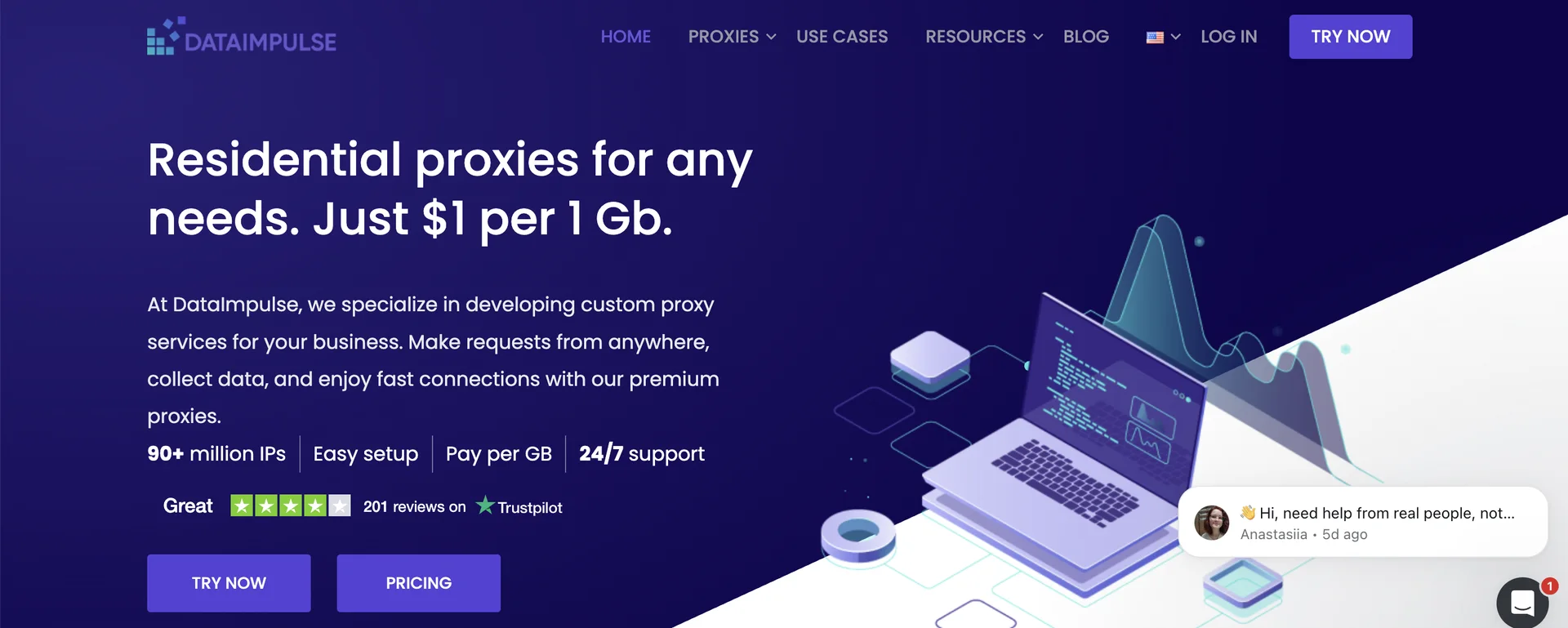
Best Residential Proxies for 2026: Reliable IPs for Every Use Case
Residential proxies have become an essential tool for anyone managing multiple accounts, scraping data, or testing localized content. They provide real user IPs, making your online actions look natural and reducing the risk of bans or verification checks.
In this article, we:
- Outline key factors to consider when choosing a provider.
- Review the best residential proxy providers of 2026.
- Explain how residential proxies work and why they’re safer.
What to consider when choosing residential proxies
Selecting the right residential proxy provider goes beyond price or data volume. The ideal service should balance speed, reliability, security, and flexibility to fit your project’s technical needs. Here are the main factors to consider before making a choice:
1. IP quality and source
The foundation of any good proxy service is the quality of its IP pool. Choose providers that use real residential IPs from verified ISPs rather than recycled or low-quality peer-to-peer addresses. Clean IPs reduce the risk of CAPTCHAs, blocks, and false positives when accessing sensitive platforms.
2. Session control and rotation options
Depending on your task, you may need either rotating or static sessions.
- Rotating residential proxies automatically change IPs on each request, ideal for scraping large data sets or continuous monitoring.
- Static residential proxies keep the same IP for long-term logins, automation, or account management.
Providers like NodeMaven and NetNut offer both options for maximum flexibility.
3. Speed and stability
Residential proxies can be slower than datacenter ones due to their routing through real devices. A good provider minimizes latency through optimized routing and low block rates. Look for services that publish average response times (under 0.5s) and success rates above 95%.
4. Location targeting
Accurate geo-targeting is essential if you need to simulate traffic from a specific country, region, or city. Some providers even offer ASN and ISP-level targeting, which can be critical for localized testing, price tracking, or SEO analysis. Ensure your provider has wide coverage across key markets relevant to your use case.
5. Bandwidth pricing and data rollover
Check how providers charge for traffic. Some use pay-as-you-go pricing, while others offer monthly subscriptions with discounts at higher volumes. Features like data rollover, available in services such as NodeMaven, help you carry unused bandwidth into the next billing cycle—especially useful for irregular workloads.
6. Authentication and integration
Verify whether the service supports both username/password and IP-based authentication. This allows flexible setups for automated scripts, API access, or browser extensions. Integration with tools like Multilogin, Geelark, or scraping frameworks can streamline proxy management and rotation.
7. Support and documentation
Reliable customer support can save hours of troubleshooting. Prioritize providers that offer 24/7 assistance, detailed API documentation, and responsive onboarding help. Strong technical guidance ensures smoother deployment, especially for enterprise-scale projects.
8. Compliance and transparency
Finally, always consider the provider’s data sourcing practices. Ethical and GDPR-compliant networks like Bright Data and SOAX guarantee that IPs come from consensual sources. This not only protects you legally but also ensures long-term service stability.
When deciding between different proxy types, it’s worth reading our detailed comparison between residential and ISP proxies.
List of the best residential proxies
Below you’ll find a curated list of the most reliable residential proxy providers in 2026, chosen for their speed, IP quality, session stability, and overall value for both individual users and enterprise projects.
1. NodeMaven
Pricing
Key Features
NodeMaven focuses on clean, stable IPs for tasks that can’t afford interruptions. It’s built for web scraping, running multiple accounts, and projects that need long, consistent sessions. A real-time filter keeps 95% of the IPs clean, which reduces bans and keeps success rates high.

Features:
- Over 30M residential and 250K mobile IPs.
- Long sticky sessions that can hold up to 24 hours.
- Real-time IP quality filter to avoid flagged addresses.
- Carry unused traffic to the next month with rollover.
- Works well for social media, ticketing, and price tracking.
Pricing:
- 5 GB plan starts at €6/GB, drops to €3.3/GB with discount.
- 50 GB plan goes down to €2.67/GB with discounts.
- Pay-as-you-go plan starts at €7/GB, drops to €3.89/GB with discounts.
2. Decodo
Pricing
Key Features
Decodo is a go-to option if you need stable residential IPs without overpaying. It runs on a large global network and delivers quick response times, which makes it practical for scraping, ad checks, and running multiple accounts. Setup is simple, and the service supports both rotating and static sessions for different tasks.

Features:
- Response times under 0.5 seconds for fast connections.
- 115M+ IPs with worldwide city and state targeting.
- Option to use static sessions for longer tasks.
- Handles high-traffic projects with unlimited threads.
- Comes with API access and a browser extension.
Pricing:
- Pay-as-you-go starts at $3.5/GB (50% off with code RESI50).
- 25 GB plan works out to $2.6/GB ($65/month with discount).
- 100 GB plan drops to $2.25/GB ($225/month with discount).
3. Oxylabs
Pricing
Key Features
Oxylabs is built for projects that need large-scale, precise data collection. With one of the biggest residential proxy pools and advanced filtering to remove low-quality IPs, it’s a strong fit for web scraping, ad verification, and SEO tracking at an enterprise level. The network is tuned for speed and reliability, with a focus on stable connections for high-volume tasks.

Features:
- Uses QUIC protocol for response times around 0.4s.
- Filters IPs by latency and bandwidth to reduce blocks.
- Supports detailed geo-targeting, including ZIP code and ASN.
- API-driven dashboard with usage stats and team controls.
- ISO-certified infrastructure designed for security and uptime.
Pricing:
- Pay-as-you-go starts at $8/GB (50% off with OXYLABS50).
- Starter plan: $7.5/GB ($150/month after discount).
- Advanced plan: $6.98/GB ($300/month after discount).
4. SOAX
Pricing
Key Features
SOAX gives you access to a wide range of residential and mobile IPs across the globe. It’s built for tasks that need precise location targeting and steady connections. You can choose between rotating and sticky sessions and set how often IPs change, which helps avoid blocks when scraping, checking ads, or running multiple accounts.

Features:
- 155M+ residential IPs and 30M+ mobile IPs worldwide.
- Custom rotation settings to control session length.
- Unlimited concurrent connections for heavy workloads.
- Advanced Web Optimizer to keep connections stable.
- City, region, and ISP-level targeting included with all plans.
Pricing:
- Starter plan: $3.60/GB with 25 GB ($90/month).
- Professional plan: $2.46/GB with 300 GB ($740/month).
- Pay-as-you-go starts from $4/GB with no commitment.
5. NetNut
Pricing
Key Features
NetNut uses IPs sourced straight from ISPs, which gives it stable, low-latency connections. It’s built for heavier jobs like large-scale scraping, price tracking, and managing multiple accounts. The service also offers static residential IPs when you need to keep the same address for longer tasks.

Features:
- ISP-based IPs for steady and reliable sessions.
- Mix of ISP and peer-to-peer networks for wider coverage.
- Option for static residential IPs for consistent use.
- Tracks success rate, errors, and response times in detail.
- Aimed at high-traffic, data-heavy projects.
Pricing:
- Starter plan: $3.00/GB with 28 GB ($84/year).
- Professional plan: $2.12/GB with 800 GB ($1,696/year).
- Master plan: $1.59/GB with 2 TB ($3,180/year).
6. Bright Data
Pricing
Key Features
Bright Data runs one of the biggest residential proxy networks, with 72M+ IPs across 195 countries. It’s aimed at businesses that need accurate, large-scale data collection while staying compliant with strict privacy rules. The service focuses on reliable connections, advanced targeting, and strong developer tools for scraping, research, and ad verification.

Features:
- Robust API and open-source proxy manager for custom setups.
- GDPR and CCPA compliant with ethically sourced IPs.
- Cached Pages tool helps cut bandwidth use.
- IPv6-only IPs and OS-level targeting for niche tasks.
- 24/7 support with quick response times.
Pricing:
- Pay-as-you-go starts at $4.20/GB with code RESIGB50.
- 138 GB plan: $3.57/GB ($499/month after discount).
- 316 GB plan: $3.15/GB ($999/month after discount).
7. DataImpulse
Pricing
Key Features
DataImpulse is built for users who need affordable residential IPs without strict usage limits. Traffic never expires, making it a good fit for smaller projects or long-term tasks that don’t use data quickly. With its own proxyware network and simple setup, it offers a straightforward way to run scraping, ad checks, or SEO monitoring on a budget.

Main Features:
- Traffic never expires, giving full control over usage.
- Pay-as-you-go pricing starting at just $1/GB.
- IPs sourced through their own proxyware network.
- Sticky and rotating sessions available.
- Simple integration with one-line setup.
Pricing:
- Intro plan: 5 GB at $1/GB ($5 total).
- Basic plan: 50 GB at $1/GB ($50 total).
- Advanced plan: 1 TB at $0.8/GB ($800 total).
What are residential proxies?
Residential proxies route your connection through IPs that come from real home or mobile devices provided by internet service providers. Because these IPs belong to everyday users, websites treat them as genuine traffic. This makes residential proxies much harder to detect or block compared to datacenter proxies, which often share ranges linked to servers.
For readers who are new to this topic, our beginner-friendly article “What Is a Residential Proxy?” explains how these proxies work and why they’re used.
Different types of residential proxies
- Rotating Residential Proxies: Change IPs automatically on every request or at set intervals.
- Static Residential Proxies: Keep the same residential IP for longer tasks or consistent sessions.
- Mobile Residential Proxies: Use 3G/4G/5G IPs from mobile carriers, which often have higher trust levels.
For a broader overview of proxy services beyond just residential options, refer to our updated list of the best proxy providers in 2026.
How to be sure your selected proxies are working
Before you rely on proxies for scraping, account work, or localized testing, verify they actually behave like real residential IPs and remain stable under load. Follow these quick checks:
Quick checklist
- Confirm the proxy IP resolves to the expected country/city.
- Verify no DNS, WebRTC, or header leaks that reveal your real IP.
- Measure latency and throughput to ensure acceptable speed.
- Test session persistence (sticky vs rotating) for login-heavy tasks.
- Run real-world tasks (login, checkout, page scrape) to confirm reliability.
- Monitor success rate over time and watch for blocks or CAPTCHAs.
To quickly verify your proxies, use Pixelscan:
- Connect your proxy to your browser or app.
- Open Pixelscan.
- The check will run automatically.
- Review the results for IP location, leaks, speed, and session stability.
This ensures your proxies are functional and ready for use.
FAQ
What makes the best residential proxies different from datacenter proxies?
The best residential proxies use IPs from real devices, making them appear as normal users online. Datacenter proxies come from servers and are easier for websites to detect and block.
Are the best residential proxies good for managing multiple accounts?
Yes. They help you avoid detection by assigning each account a unique IP, reducing the risk of bans on platforms that monitor login patterns.
Can I use the best residential proxies for web scraping?
Absolutely. They are ideal for scraping because they mimic real user traffic, which helps bypass anti-bot systems and reduces block rates.
What type of residential proxy should I choose for long sessions?
Static residential proxies work best for long sessions since they keep the same IP address active for hours or even days, depending on the provider.
Are residential proxies legal to use?
Using residential proxies is legal as long as you follow the provider’s terms and avoid illegal activities. Always choose providers that source IPs ethically.
How do I pick the best residential proxies for my project?
Look at IP quality, success rate, rotation options, and pricing. Match these with your use case—scraping, ad verification, or account management—to find the best fit.
What are private residential proxies?
Private residential proxies are exclusive IP addresses sourced from real user devices and assigned to a single client at a time. Unlike shared proxies, they provide full control over bandwidth and connection stability. This exclusivity helps prevent bans, improves session reliability, and ensures that your activity looks like genuine residential traffic. Providers like NodeMaven and NetNut specialize in private residential proxies ideal for automation, web scraping, and multi-account management.
What is a residential proxy 1GB plan?
A residential proxy 1GB plan means you’re purchasing a data allowance of one gigabyte for residential IP traffic. It’s a flexible way to test proxy performance before committing to larger packages. Many top providers—such as Decodo, Bright Data, and DataImpulse—offer affordable 1GB entry plans that are perfect for small scraping tasks, login testing, or localized browsing. Once you reach the 1GB limit, you can easily upgrade to higher plans with lower per-GB rates.
What is an IP residential proxy?
An IP residential proxy routes your internet connection through a real home IP provided by an Internet Service Provider (ISP). This makes your requests appear to originate from an authentic residential user rather than a data center. IP residential proxies are commonly used for market research, ad verification, and managing multiple accounts, as they reduce the likelihood of detection and blocking by websites.
How to use residential proxies?
To use residential proxies, connect them through your browser, automation tool, or scraper. Simply enter the proxy IP, port, username, and password into your application’s proxy settings. Most tools support HTTP(S) or SOCKS5 protocols. For managing multiple connections or identities, you can integrate them into platforms like Multilogin or similar browser managers to assign each profile a unique residential IP. This setup helps maintain stable sessions while mimicking natural user behavior.
What are static residential proxies?
Static residential proxies provide a fixed IP address from a residential network instead of rotating with each request. They’re ideal for long-term tasks such as account management, login sessions, and consistent data scraping. Services like NetNut and SOAX offer static residential proxies for users who need persistence without losing the residential authenticity of their connection. Unlike rotating proxies, they maintain the same IP for as long as needed, ensuring uninterrupted workflows.
Conclusion
Choosing the right provider comes down to what you need most: clean IPs, reliable speed, or flexible pricing. The best residential proxies offer real device IPs that help you avoid bans, gather data, and manage accounts without raising flags. Whether you’re running small projects or large-scale operations, matching the provider to your use case will give you better results and lower costs in 2026.